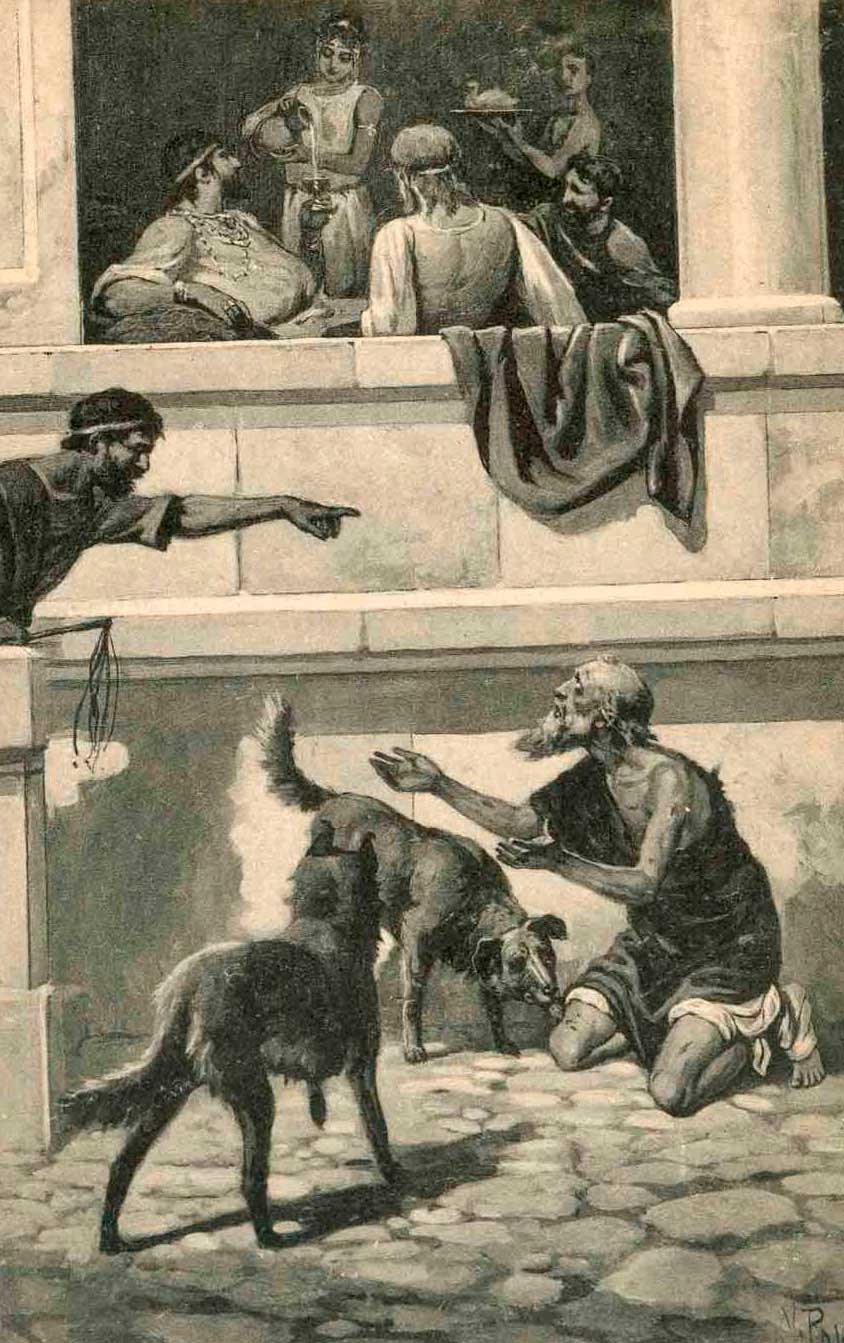
How to be or become a follower of Jesus Christ in the world and in your situation«No servant can serve two masters. He will either hate one and love the other, or be devoted to one and despise the other. You cannot serve God and mammon»
Luke the Evangelist extensively developed the theme of the use of money and wealth with two significant parables:
- The parable of the dishonest steward (16:1-8);
- The parable of the rich man and Lazarus the beggar (16,19-31).

Lazare and the rich manthese two parables Jesus adds some reflections on the danger of wealth (16.9-13) and a severe rebuke to the Pharisees, denouncing their hypocrisy (16.15) and their attachment to money (16.14-18), which is a seductive idol capable of dominating people, and making them capable of all wickedness, but above all of ignoring their neighbor.
To show all its intrinsic edifying value, the teachings of Our Lord Jesus Christ must however be contextualized, that is, to be seen at the time and in the places where they has been written, and interpreted to be brought ahead up to today.
In view of the future validity of the teaching, as in every passage of the Gospel, also in this one Jesus doesn't mention any systems of government or organization or anything related to the world.
Teaching is always directed towards the individual and his own spiritual part. It is ALWAYS aimed at individuals, because, it is the individuals who must contribute to the betterment of society as a whole.
Today, the poor like Lazare are no longer here, although there may be a similar situation in some very poor countries or even in those where the legislation barely takes into account the duty of the community to help people in state of poverty, in the very interest of society as a whole.
- Is Wealth “Dishonest”? Apart from the translation from the Greek, which can also have other meanings than this, it seems obvious that this is the case of.
The unfaithful administrator uses it to ensure a future. The symbol to me is quite clear and is then repeated in the passage.
Jesus tells me that in view of the future moment, I don't know when that I will leave this world, I must not be selfish today, but I must use wealth - either honestly earned or even "dishonest" - to do good.
- is wealth always dishonest? It seems obvious that it is not wealth itself - owning something - that is dishonest, but the use to which it is put. An insensitive and selfish being like this rich man is a slave to it, like a heavy smoker, or a cocaine addict, or an alcoholic who does not stop drinking and even kills himself, they are slaves to their vice
Wealth, on the contrary, is honest when it is well obtained and well used, and especially when it is not tied, no dependence is created on it.
- A person can always change, even at the last moment of his life or almost at.
Even though it would be better to do it sooner than later, one can repent and gain paradise.
Other times, Jesus said that wealth is inherently dangerous. The dismayed disciples then wondered "who can ever be saved?".
At this point, I quote a phrase from Saint Augustine, which has been echoed by many scholars:
«So learn to be poor and destitute: whether or not you have anything in this world. You can find, indeed, even proud beggars, just as you can find humble a man full of riches. “God resists the proud,” as much if he is clothed in silk as in rags; “To the humble, on the contrary, he gives his grace” (Jam 4:6), whether or not they possess wealth in this century.»
Let's contextualize this to our present
As for me, I know well that to please Jesus I must help my neighbour, according to my possibilities. But there is also an order to respect in loving one's neighbour: first comes my family, then those closest to me, and finally all the others. And in doing so, I must be careful not to harm others, or even myself. Do not harm anyone.
It then seems obvious that in the context of today, of the extreme complexity of this global human society due to the number and multiplicity of beliefs and interests, the problems cannot be solved simply by alms: applying old-fashioned pauperism, that suggested in the parable of the rich insensitive, is useful but it does not seem decisive and it is not at all.
That each of us, whether to deserve heaven or for simple philanthropy, exercises charity prudently, according to his possibilities or as he best believes in conscience, is a positive thing and I would say obligatory.
That there are organizations which really help others in difficult times, and which are not organized primarily to raise funds and maintain themselves, is also a very positive thing, perhaps they would be needed more, but that's not how we solve the problems of an entire human society.
Today, society's common problems can be solved and improved or, on the contrary, they can be aggravated or even made critical by the exercise of politics, and everyone has their own recipe about.
BUT HERE ALSO JESUS INTERVENES AND SAYS: “By their fruits you will know them” (Mt 7,20). the phrase, because it is generic, applies to both individuals and groups of people.
A GOOD TREE GIVES GOOD FRUITS AND A BAD TREE GIVES BAD FRUITS.
Good politics does not seek to level and bring everyone to the same standard of living, violating individual freedom and mortifying individuals. To generalize pauperism, starting from the volunteering of the ascetic to extend it to a whole society by law, has never given good results.
In politics you can always make mistakes, but if decisions are made consciously and problems are faced by weighing the greater good and the lesser evil of each of the choices that are made, always inspired by Christian principles, the right fruit cannot be missing.
It is no coincidence that people's living conditions are on average worse in parts of the world where the principles of Christianity are lacking, or are distorted by ideology or even culpably neglected.

Don't worry ! the mercy of Jesus
is INFINITE
Holy Gospel of Jesus Christ according to Saint Luke 16,1-13.
He summoned him and said, 'What is this I hear about you? Prepare a full account of your stewardship, because you can no longer be my steward.'
The steward said to himself, 'What shall I do, now that my master is taking the position of steward away from me? I am not strong enough to dig and I am ashamed to beg.
I know what I shall do so that, when I am removed from the stewardship, they may welcome me into their homes.'
He called in his master's debtors one by one. To the first he said, 'How much do you owe my master?'
He replied, 'One hundred measures of olive oil.' He said to him, 'Here is your promissory note. Sit down and quickly write one for fifty.'
Then to another he said, 'And you, how much do you owe?' He replied, 'One hundred kors of wheat.' He said to him, 'Here is your promissory note; write one for eighty.'
And the master commended that dishonest steward for acting prudently. "For the children of this world are more prudent in dealing with their own generation than are the children of light."
I tell you, make friends for yourselves with dishonest wealth, so that when it fails, you will be welcomed into eternal dwellings.
The person who is trustworthy in very small matters is also trustworthy in great ones; and the person who is dishonest in very small matters is also dishonest in great ones.
If, therefore, you are not trustworthy with dishonest wealth, who will trust you with true wealth?
If you are not trustworthy with what belongs to another, who will give you what is yours?
No servant can serve two masters. He will either hate one and love the other, or be devoted to one and despise the other. You cannot serve God and mammon."



